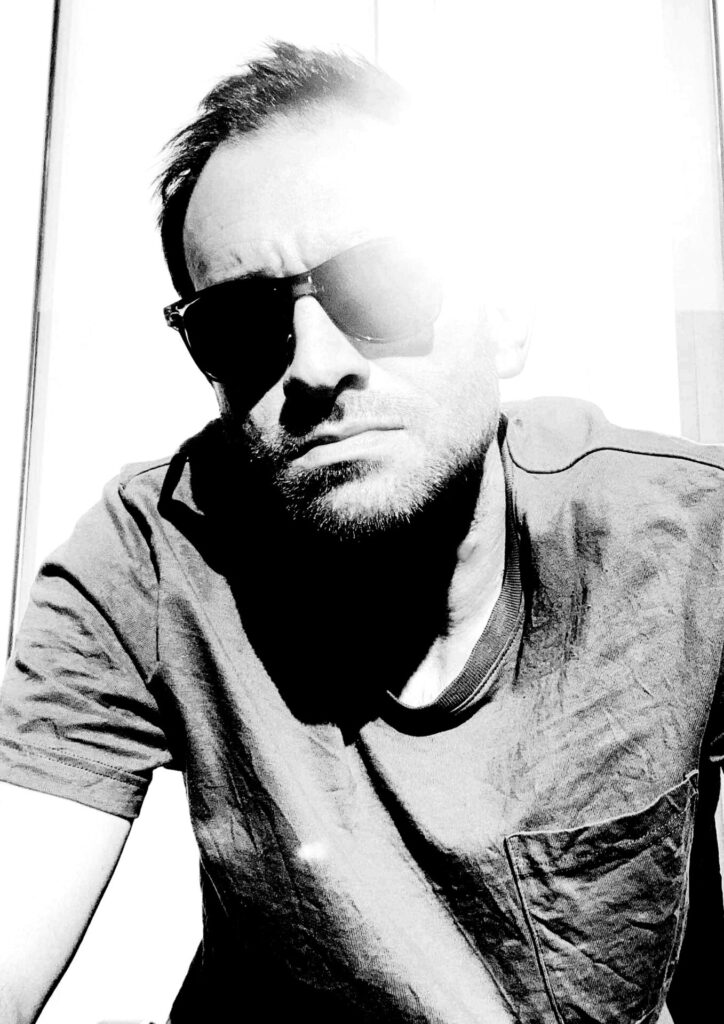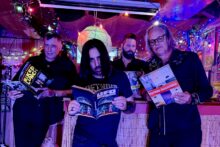What does it feel like to hear the future?
Ask Mike Vest.
As an addictive collaborator with an insatiable thirst to work, and a zealous practitioner of a particular species of landscape electric guitar maximalism, Mike Vest is a mosaic compiled of many different pieces.
A spotter’s guide to the extremes, drop your finger and drag it through anywhere in his extensive career and you’re bound to land on some extraordinary pieces of fuzzed-up no-fucks spectacles of synapse-scourging psych-noise. In the last decade alone his immense catalogue has grown more than a limb or two, boasting projects including (but as these selected moments from his astounding 70-plus albums testify, never limited to): Downtime, Neutraliser, Lush Worker, Brain Pills, Ozo, 11Paranoias and Haikai No Ku; all on a banquet of cult labels such as Cruel Nature, Cardinal Fuzz, Riot Season, Ritual Productions, Echodelick Records and many more.
A fan of music for as long as he can remember, but without any certified, identifiable moment where the baptismal mark was made, Vest began playing in groups when he was 15. Reared on those all-essential ‘1960s and 70s best of’ tapes, perfectly curated gateways into the gamut of a band’s history (in Mike’s case, Cream, Hendrix) that could, despite the size of the portable hi-fi that he carried around as a child, propel him into wide-open vistas of musical futures and mental freedom.
When Vest was 20, he formed Bong, a band responsible for music that gives speakers a haemorrhage, as though burrowing a hole into a slab at Stonehenge. It was also a formation that coincided with the musician augmenting his musical palette through a plethora of artists, and being introduced to minimalist composers. It was at this moment that he became engrossed in the hydrocarbon-swamp of noise, drone, minimalism, and other experimental styles of music where a spectrum of “mild realisations” started to spike on his radar. These revelations were only reinforced by watching bands such as outsider iconoclasts Vibracathedral Orchestra, Newcastle’s avant-garde electro-acoustic trio Jazzfinger, and the doom drones of Marzuraan.
When it comes to Vest’s relationship to the guitar, there is nothing moralistic to prove. No argument that there are wrongs to right regarding the current state of rock or psych, and the usage of the instrument to explore those genres. He belongs to an entirely different category of artists, a different kind of purity. Upon releasing each new album (regularly within the sacred formula of guitar, bass and drums), he provides an education for the listener. All the music Vest is involved with is a form of ‘rock’, whether that be drone, doom, prog, jazz, improv, punk or psych.
Recently, he’s developed a healthy obsession for working with underground Japanese artists that possess what says are ‘earth codes’ – distinct ways of being, doing and making. They’re an ethical throughline to harness, a sign of visionary idiosyncrasy shared between sonic soldiers dispatched to the same post. Although, since 2016, these have remote creations accomplished via the exchange of files and mixes back and forth, they have just as much force, vigour and integrity as something made in the tangible dimensions of the flesh – and all without the burdensome anxieties of studio pressure. “The key”, Vest says, is to “find the time. Time to listen, time to think and free space to create. Speak only of the music, nothing more”.
It’s alongside legendary Japanese psych musicians such as Junzo Suzuki, Aoki Tomoyuki (of Up-Tight) and Mitsuru Tabata (of Boredoms, Zen Geva, Missing Heads, 20 Guilders) that Vest’s diverse musical narrative has stretched into the uncharted terrains of collaboration and collectivity, assimilated into the earth codes of others whilst respecting their venerated energy, as well as his own.
His first exposure to this underground scene was when, aged 21, he discovered compilations by the label PSF. Founded by Hideo Ikeezumi, and specialising in the excavation of the Japanese underground through artists as disparate, bizarre and extreme as Kazuo Imai, Hasegawa-Shizuo, eviscerating noiseniks Incapacitants, the glacial psychedelia of Fushitsusha, Ghost, and explosive garage rockers High Rise, these albums provided Vest with an initiative, an incentive, a whole world to devour below the tip of the iceberg. ‘’I’m drawn to the unfathomable’’, he says. ‘’I remember getting a bunch of them in one go. It was and still is a whole other world of music. Their convictions cannot be matched’’.
Although Vest’s albums appear to demonstrate something wholly unhinged, the philosophy of improvisation in Mike’s work is understood with an acute sense of freedom, proactivity, drive, perfection, control, transience and transcendence. It’s an achievement he sometimes finds himself wrestling with, but equally, sometimes, he constructs entire sections of songs around ‘errors’. “I think there is a misconception over improv and experimental music, as in suggesting that there is no quality control. But this just isn’t the case,” he explains. “I don’t consider myself experimental. Or an improv guitarist. It’s more like a stream of consciousness approach, different every time”.
Operating in a collaborative/combative realm where the ego is left to kneel at the guillotine, and possessed by drone’s “ability to induce trance-like states through repetition” in both its audiences and respective creators, Mike’s work resides in the eye of the heat, the ‘edge of the red’. It’s here, founded upon, and fed through, a unique configuration of ideologies – know your surroundings, choose your battles and master your demons – whilst satisfied in a state of discordance and feedback, where Mike Vest’s aural paintbrush, his sonic shotgun, reign supreme.
What does it feel like to hear the future?
Rock on.
Drunk In Hell – ‘I’m Not Laughing’ from Drunk In Hell (2017)
Mike Vest: I joined the Drunks when I was 27. I’m now 42. So this was a very long time ago. After it was recorded, it took an additional seven years to hand it over to the label. So it’s hard to remember. I was instructed to make no mistakes and play with conviction. I obliged. The themes, stories and lyrics written by the drummer were actually self-deprecating, sad tales that actually happened. Grim and sepia is how I actually remember that time.
Bong – ‘TIön Uqbar Orbis Tertius’ from Thought & Existence (2018)
MV: This is technically our most recent studio album. We have never tried to play music that doesn’t come naturally. This is the sound that we have continued with over the many years. We improvise a lot. There is no rebellion in what we do. We spent the last 20 years being totally oblivious to the ever changing scenes. We played alongside so many metal, doom, punk, noise, improv, experimental, jazz, drone bands and artists over the years. Sailing through all of it, playing our song. When we first started, it took me like four years to get a decent guitar tone and setup. Maybe even longer. The early years were just exploration really.
MIENAKUNARU – ‘Mega Blocks’ from Strato Arcology (2022)
MV: I would run into Junzo [Suzuki] here and there, shows, festivals. We started working together in 2019. Our first album Lost Bones Of The Holy Butterfly was released in 2020. This was our third album. His style is total ghost blues, loads of reverb, delay, so it’s just a huge wash of sound. Built on two lengthy bass and drum compositions and he played through each track seamlessly in one take and I don’t think he even stopped for a break. Unrelenting freedom of expression. I miss working with him. He helped pave the way for my collaborations with Mitsuru [Tabata], Aoki [Tomoyuki] & a new trio with Masami Kawaguchi, out on WV Sorcerer Records next year.
Artifacts & Uranium – ‘Sound Of Desolation’ from The Gateless Gate (2023)
MV: We made four albums in a short period. This was during the pandemic. Kinda kept us both sane, something to distract ourselves and to be freely creative. Fred Laird mixed, composed and played a lot of the instrumentation on these records. He was in Earthling Society for a few years and is currently releasing music under the name Empty House. All was arranged and mixed by Fred. The three albums complement each other. We also did a fourth album with Mitsuru Tabata and Nick Raybould.
Modoki – ‘Multiplied from the Old Days’ from Luna To Phobos (2023)
MV: I got to know Mitsuru through Junzo Suzuki. He was seriously injured back in early 2022 and was in hospital for a long time. So I was in touch with Mitsuru, sending all the albums I had made with Junzo, so he could set up a Bandcamp page for him. So over time Mitsuru and I started planning to make some albums. Dave Sneddon, a great drummer, runs a publishing house called Amorphous Pieces. We would go to a studio across town [First Avenue Studios] and just record loads of drum tracks frequently. I would then take the stems home and start to arrange them for use. Some of these drum sessions were used on both Modoki albums.
Tomoyuki Trio – ‘Anxiety & Ecstacy’ from Shitsuren (2024)
MV: It started with me just adding descending and climbing bass lines to drum tracks that were set aside for the album. Really simple progressions, repetitive and dark. Aoki’s leads are incredible, with such a thick tone and moreful execution. So laid back, yet utterly destroying. The same methodology was applied to both albums. I wrote all the basslines first. Aoki added his guitars and vocals. This album is rawer than [the trio’s previous LP] Mars, less delay on the vocals and sparse production. Garage vibes.
Depth Charms – ‘Jump Jet’ from Ver Sessions (2024)
MV: The albums were all done very quickly really, no second guessing or playing parts over. We worked on one a month for three months. It’s all really stripped back, fewer guitar and loose drums and bass tracks. I like the idea of keeping the first take, as it sounds real. Also, sometimes you find great harmonics in ‘wrong notes’ and they can be a springboard to the next discovery. Perfection is hard to manifest. Something that you find ‘perfect’, could be imperfect to another. That is the beauty of art and music making, you can just do whatever you want.
Pascere Lamia – ‘Sanguis Ebruis Est’ from Pascere Lamia (2024)
MV: This album began with drum tracks, then Charlie [Butler] sent me bass, drones and guitar. So this album’s initial theme was established by him and Nick [Raybould]. All the collaborations, trios etc, are all different. I don’t search for anything, really. I just adapt to the landscape. It just depends who is involved, who leads or initiates the proceedings sometimes. Nick added more percussion at the later stages of mixing. Which brought the whole album together. Added another crucial layer.
Kaliyuga Express – ‘The Living Dream’ from Occult Future (2024)
MV: Our debut began with Iikka [Vekka] sending me minimal bass and drum tracks. At the time I thought the guitars should be ‘busy’ in their form. As I started to work on it, it just didn’t feel right. Then eventually, I decided to record what felt like endless ‘one note’ guitar tracks but each in a different octave, some discordant and some harmonic. A lot of automation and listening. I basically made an album within an album. There was a lot more instrumentation from Nolla on this one, our second. So it made sense for Otto [Juutilainen] to mix this time. More time was spent on vocals and song structures. Added a different vibe to the finished album, they both complement each other within that hemisphere.
Hollow Eyes – ‘More Police’ from So Many Easy Ways To Pay (2024)
MV: This is our debut album, which is a four piece with members of Terminal Cheesecake, Luminous Bodies, Bruxa Maria, Head Of David and Gruel. I gathered all the drum tracks together for the album, added guitars to a few tracks, then sent them on to Gordon [Watson] so he could record, write guitars and vocals. Once added, they plotted the destination. He was making his own pedals at the time, so his guitars were really raw and overblown. So the aggression in his playing shaped the album. I followed.
Mike Vest’s new album as a part of Hollow Eyes, So Many Easy Ways To Pay, is out now via Riot Season




